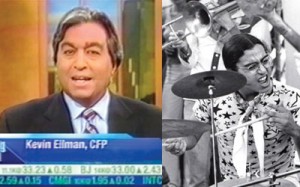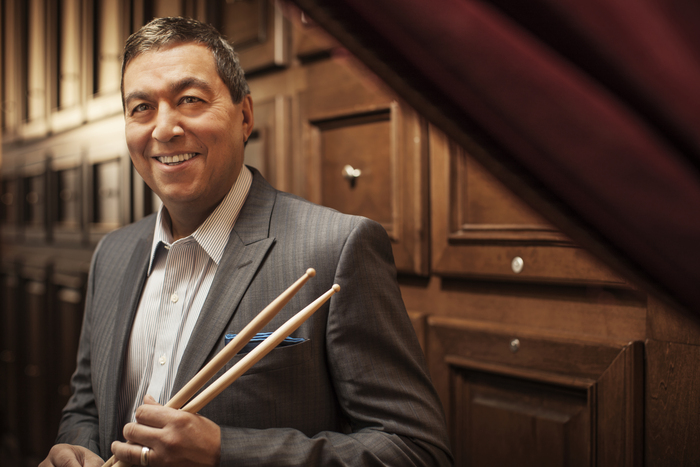 Back in the day, I was a professional drummer, playing with such music greats as Bette Midler, Manhattan Transfer, Barry Manilow, Mary of Peter, Paul & Mary, Chuck Berry, Todd Rundgren, Laura Brannigan, Richie Havens, and Felix Cavaliere and Gene Cornish of the Young Rascals. When I tell people that I believe this was great training for becoming a wealth manager, they look at me askance, at least until I elaborate. The truth is, being a professional musician taught me how to: Be a team player, be intuitive and sensitive, be a good listener, make people feel good, value the importance of continuing to learn and hone one’s craft, give my best each and every time, be open and candid, be ready to improvise, and finally, be fully focused in the moment.
Back in the day, I was a professional drummer, playing with such music greats as Bette Midler, Manhattan Transfer, Barry Manilow, Mary of Peter, Paul & Mary, Chuck Berry, Todd Rundgren, Laura Brannigan, Richie Havens, and Felix Cavaliere and Gene Cornish of the Young Rascals. When I tell people that I believe this was great training for becoming a wealth manager, they look at me askance, at least until I elaborate. The truth is, being a professional musician taught me how to: Be a team player, be intuitive and sensitive, be a good listener, make people feel good, value the importance of continuing to learn and hone one’s craft, give my best each and every time, be open and candid, be ready to improvise, and finally, be fully focused in the moment.
Most parents think that playing sports is one of the best ways for young people to learn teamwork. Another great way to learn how to work in groups is to play music in a band or an orchestra. The difference is that in competitive sports, the object is to win. In a band or orchestra, the goal is for the musicians to make great music together. A musician must be hyper aware; to listen, to read body language and to develop a sensitivity radar for other members in the group. A musician must also often follow a conductor or a bandleader; there are no words, just body language to intuit what they want.
I remember playing with Bette Midler before a sold out audience at Carnegie Hall. At that time, Barry Manilow was the Musical Director. We were playing, “You Gotta Have Friends.” Normally, we would go to the chorus after playing each verse, like we did every other time we played this song. This time, for some reason, Bette decided to sing two verses in a row. She didn’t turn around and say, “Hey guys, let’s do another verse before we go to chorus,” she just started singing the verse. I was able to anticipate, just by observing her body language and Barry’s facial expression, what was about to happen. Rather than opening up and letting the sound get bigger and more syncopated in preparation for the chorus, I was able to maintain the groove for the second verse seamlessly, and everything sounded great.
This experience, and thousands more like it in my musical career, trained me to be an excellent listener and to tune into and sense how other people feel, whether they voice their feelings out loud or not. Sometimes, clients know exactly what they want, others, need a little help bringing their goals into focus. As a financial advisor, my purpose is to help clients, within their comfort zones, identify and reach their financial goals.
When I recorded with Todd, sometimes he would tell me exactly what he wanted me to play. Often, however, I had to compose my drum part by listening to the lyrics and listening to what the guitar, bass and piano were playing. As a drummer, I was not the star, but a member of the “rhythm section.” My job was to support the lead singer and the musicians by playing a rock solid groove that backed them up, enhanced the musical performance, and made them and the audience feel good.
That attitude, “to make others feel good,” is the cornerstone of my business. Although a client’s financial well-being is the ultimate goal, the road to achieving that goal may be years in the making. Along the way, I want my clients to feel confident in their future and that their plan is on track.
When I say Rock and Roll drummer, many people think I lived some crazy lifestyle. What most folks don’t realize is that many musicians are essentially nerdy and that the life of a musician involves constant practice. As a student and professional musician, I spent more than 10 years practicing eight hours a day. I take the same approach with my wealth management business. I am constantly reading, studying, listening to experts and learning in order to continuously perfect my craft.
Being on stage in front of an audience, with nowhere to hide, taught me to be open, transparent and to give my best performance each and every time. Making a recording in the studio was the same thing. Everything was carefully scrutinized by the producer, the engineer, the artist and all the other musicians. When I make a recommendation or create a financial plan, I fully expect it to be subject to and be able to stand up to that same kind of intense scrutiny from clients and their lawyers, accountants, other advisors and regulators.

Kevin Ellman, 2014. Photo by Robert Snow Photography
This experience taught me the importance of building extra flexibility into every plan. It is essential that a good plan incorporate being prepared for unforeseen circumstances. For example, I won’t buy anything for a client that can’t be sold and turned into cash within 24 hours. Anybody who watches financial markets knows that things can change very quickly. Families change, businesses change, health changes. A financial plan must be flexible and able to handle the unpredictable.
Lastly, playing music in a group trains one to be fully present and focused. When I meet with clients, I give them my 100 percent complete and undivided attention. There are no phone interruptions, no checking email, no associates interrupting, just my complete focus on clients and their needs.
Bottom line: My background as a professional musician has made me a better wealth manager.
Learn more about Kevin Ellman CFP®.